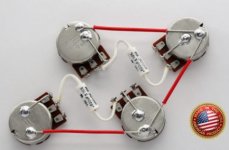I've noticed than a common practice on electric guitars is to solder a ground wire across the tops of the volume/tone pots. Yet the loop is never closed, a 3/4 loop instead of all the way around.
But if a rear ground plate or PCB is used to hold the pots...all the pots are grounded together. This doesn't seem to pose any grounding issues.
So why is the "loop" never closed when using a wire? Does it create a true ground loop or only a perceived one? Just wondering.
But if a rear ground plate or PCB is used to hold the pots...all the pots are grounded together. This doesn't seem to pose any grounding issues.
So why is the "loop" never closed when using a wire? Does it create a true ground loop or only a perceived one? Just wondering.
Attachments
There is no need to close the connections as we don't want or need a loop.
The reason we use the case is for convenience more than electrical improvement.
The reason we use the case is for convenience more than electrical improvement.
...why is the "loop" never closed when using a wire?...
It costs 33% more for wire, 25% more for labor, and has NO advantage at this scale.
And, not that it matters, it would become a true loop. A ground-plate can be involved in loops but is not of itself a loop. If you say there are holes in it, note that loop reception goes as the size of the hole. A 3/8" pot hole is very different from a 4" wire loop.
I think there is advantage in doing this as it forms a localized ground plane in the absence of other available metal. Are there any complaints from guitarists ?
Electrical resistance of this short wire is low enough.
You would not gain much if all pots were connected.
And then, as previously already mentioned: cost.
You would not gain much if all pots were connected.
And then, as previously already mentioned: cost.
...it forms a localized ground plane in the absence of other available metal....
If we need a ground plane, we can buy metal. In DIY, scrap roof flashing. If you make a lot of guitars, a roll of aluminum heat-duct tape is not real expensive. Fancy copper tapes can be bought (bring money).
It has always struck me how "nice" the outside of a guitar is (even if it is low-pay or robotic workers ripping them out fast as possible) and how crummy the hidden parts can be. The picture above is super-nice work and NOT what you typically find inside a guitar. The older ones make mass-market radios look like good work. Obviously any secret part-penny savings inside allow a part-penny upgrade to the posh outside, the side that $ells.
The reason we use the case is for convenience more than electrical improvement.
The cases of the pots should be grounded to avoid hum and noise pick up. Any metal in the guitar should be grounded since a stage environment with triac controlled lighting can be a electrically noisy place. Any metal that is left floating can pick up electrical / RF noise which can cause hum or that raspy buzz heard in a high gain amp.
A good guitar will have the "guts" cavity covered in metallic tape, the bridge, strings, and metal pickup cases grounded. Aluminum AC duct tape works good, but can't be soldered. The usual connection is made by a spring contact, or by mounting grounded pots through, and in contact with, the tape.
The picture above is super-nice work and NOT what you typically find inside a guitar.
Agreed, it's not typical. Having worked in electronics manufacturing since hand wired assemblies and 12AX7's were used (mil spec stuff though), I would say that the assembly seen in the first post is a well thought cost reduction / quality improvement move. It looks like the pots and parts were dropped into an assembly fixture and soldered on said fixture before being placed in the guitar or pick guard. This allows perfect assembly with pre picked and trimmed parts including a pre bent piece of wire. It also reduces the possibility of soldering iron damaged pick guards or scratched guitar bodies.
...I would say that the assembly seen in the first post is a well thought cost reduction / quality improvement move.....
It's a $36 "quickest and easiest mod you can make to your guitar" on eBay. There's similar ones up to $90, which gets you older caps but not neater wiring.
I like a copper foil lining best. I have a precision bass done like that and it is super quiet. OTOH I rewired another of my guitars with shielded wire, with the shields connected (at one end only) to a star ground point along with the pot cases. The cavity isn't shielded, but the guitar is very quiet.The cases of the pots should be grounded to avoid hum and noise pick up. Any metal in the guitar should be grounded since a stage environment with triac controlled lighting can be a electrically noisy place. Any metal that is left floating can pick up electrical / RF noise which can cause hum or that raspy buzz heard in a high gain amp.
A good guitar will have the "guts" cavity covered in metallic tape, the bridge, strings, and metal pickup cases grounded. Aluminum AC duct tape works good, but can't be soldered. The usual connection is made by a spring contact, or by mounting grounded pots through, and in contact with, the tape.
- Status
- Not open for further replies.
- Home
- Live Sound
- Instruments and Amps
- Electric guitar pots- case grounding, why?
